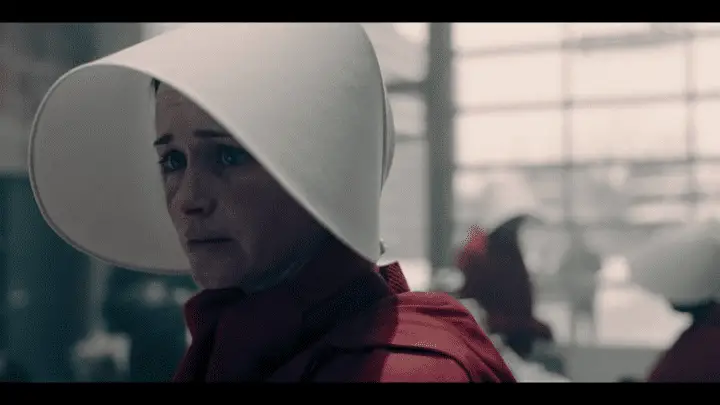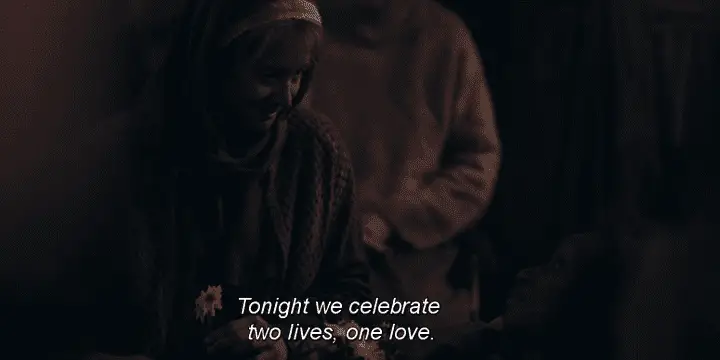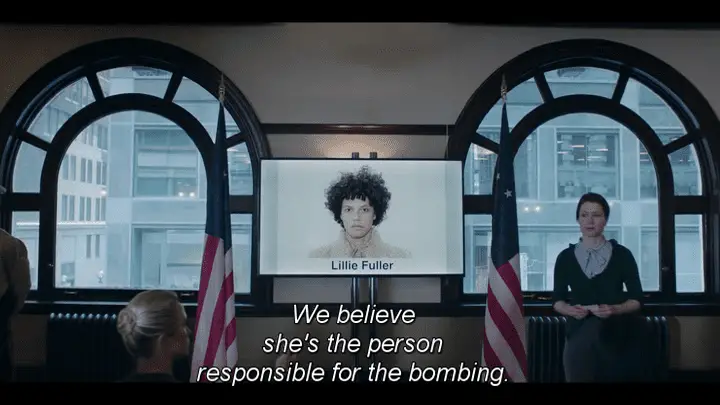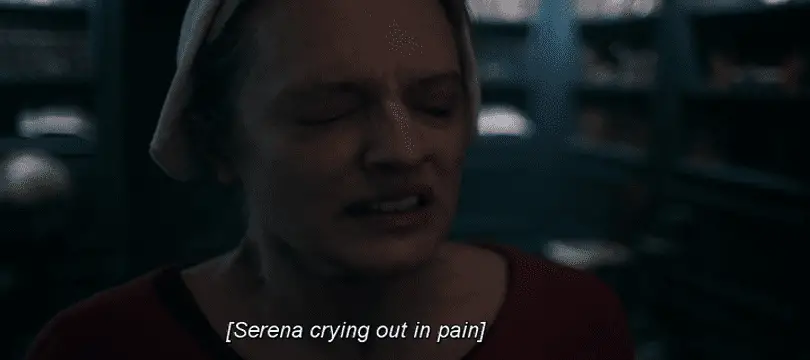Content Warning: This article discusses violence against women, including physical assault, as depicted on the show.
A few days ago, when I opened my YouTube app, the “Fred Punishes Serena” scene from The Handmaid’s Tale‘s “Women’s Work” (S02 E08) was the top video “recommended” for me. Within a few hours, I saw it go from 95k to 123k views.
The Woke Feminist Show was now providing out-of-context kinky content. Truffaut was right: the Aesop was broken.
Please, God, Make This End, And Just Nuke Gilead
Up until now, each week I would count the hours until a new episode came out. It was torture, in many ways, yet I returned to the weekly horror show that exploited each and everyone of my paranoid-fueled anxieties. This week, I didn’t care. I even forgot about the episode. Oh, I did watch it, but I took my time. I wasn’t in any hurry to return to Gilead. In fact, I increasingly wish for the whole place to be nuked, no matter if it means the death of my beloved Emily — I think we robbed her from that already. Why do I feel this way?
Something died in me last week.
It’s always the risk playing with Shock and Awe storytelling: at some point, you’ll stop caring. I stopped caring. I just want the whole show done and over.
The Breaking Point: How Far is “Too Far”?
I’m not here to judge. Maybe that scene did nothing to you. Your breaking point may differ. For some it may have been the first episode of Season 2. Or the second–rubbing in our faces Emily’s backstory after dumping her in Season 1. Because queer women are only good for inspiring the straight woman. And let’s not even talk about Moira—others have done it better. Like, why did we have to wait until episode 7 to get her damn backstory?
On top of the justified critiques of White Feminism, you could also question the show’s cisness: Where are trans women? What happened to trans men? And, most important of all: do I actually want to know? (I may not actually want to know, but wow it’s like they don’t exist in this universe.)
Well, now, The Handmaid’s Tale is starting to fail feminism itself—though that would hardly be surprising given its fear of the F word (at least last year).
You know what would be great if you wanted to go “beyond the book”? Showing the damn Resistance. Because, if you haven’t read the book, you wouldn’t really know just by watching the series that the narrative itself is a historical document post-Gilead. Gilead is OVER. But then I guess if they did, the series wouldn’t be able to revel in the many layers of horror in the ‘past’ and the ‘present’, while at the same time never giving any hope for the future.
A Revolution Without Revolution
Revolutions are messy. I’m going to take a little detour into Star Wars, but I promise I’ll come back to The Handmaid’s Tale. The new Star Wars trilogy does a good job at questioning the feel-good but simplistic ending of Return of the Jedi (both of the original and of the special edition). Oppressive regimes don’t fall so easily because oppression is structural and holds on. One good thing about the Prequels was the way they showcased how established institutions slowly morphed from the Republic to the Empire. They didn’t do so very well, but the basics are there.
In The Force Awakens and The Last Jedi, we see that there was no simple “happily ever after”, that freedom is fragile, and hope too. How easily one can give in to a nihilistic perspective because Good and Evil are made-up words. Is it better to not take a side? Does it really make you free? No. And that’s what Rogue One did well, too. You can ignore the evil going on around you, but you’re deluding yourself.
Revolutions are complicated. “You’re rebels, aren’t you?” Yes, but. Rogue One brilliantly, and very simply, highlights the tensions between moderates and radicals—between the Alliance and Saw Gerrera—and within the Alliance itself. Each choice, each decision is important. And sometimes the confrontation becomes inevitable. These themes are also cleverly explored in Steven Universe through Bismuth for example (though this show isn’t without its own issues, especially in light of the latest, possibly message-changing reveal.)
You’d think TV series given at least 10 hours of screentime would explore these ideas, all the difficult decisions, ethical implications and much-needed nuances. I guess not.
So far, the running theme of both second seasons of Westworld and The Handmaid’s Tale (and there are similarities) seems to boil down to: rebellion is worse than oppression. Dolores Abernathy is now a one-dimensional antagonist. Meanwhile, The Handmaid’s Tale ponders whether you should truly root for Mayday, the Resistance movement against Gilead, because after all they’re terrorists right?
Now I’m not saying we should paint Dolores’ or Lillie (Ofglen #2)’s actions as fully heroic and wholly pure. (Though why not? Men get to play and live through those fantasies, even when they stem from suffering, rage and revenge.) But some nuance would be nice?
Instead, the whole point can be summed up as: let’s see how far we can show suffering and violence against women to make some kind of point, shaming people for not being “strong enough” to stomach it, which means clearly they’re not “woke,” all the while undermining resistance against Gilead by morally positing it as “just as bad.”
Punishing you for NOT caring
Unlike Game of Thrones (GOT), here the cast and crew have very clear intentions: they want you to care. No matter how unwatchable and unbearable it becomes. And endless.
Because of the TV series format, there is currently no end in sight. And yet there should be because of the very book itself: it was a historical document found and studied in a world where Gilead had been defeated. The book is framed in a way to make you understand the past is past and over and there is a future and life after Gilead. Meanwhile the Hulu adaptation only knows the past and present, in which suffering is endless.
“This is painful for me as well,” Aunt Lydia (Ann Dowd) tells a handmaid in one moment. “But only in suffering will we find grace.” The Handmaid’s Tale probes this statement like a decaying tooth, exposing how rotten it is. This suffering is vicious and visceral. There’s no grace to be found.” (Sophie Gilbert)
The thing is, The Handmaid’s Tale adaptation isn’t telling us anything new. It’s not making us more “woke.” The target demographic is already well-aware. If the point is to make us act, why does the writing make us feel so powerless and hopeless each week? What kind of praxis is this? Every new episode sinks lower into hell. You thought being sent to the Colonies was the worst? Well think again! Emily sure didn’t see that coming.

It also feels like the writers had no actual idea what to do after showing the horrors of the Colonies. It was just that: showing a labor death camp. And more dead lesbians. Sure, I loved (white) Fiona and (black) Kit’s wedding scene presided by Jewish rabbi Sally–all seemingly middle-aged women (though it could also be early aging caused from toxic poisoning).

Sure, it was incredibly anvilicious, but I did honestly like it, because I do love lack of subtlety when it drives the point across–and it did. But come on. The current direction of the show wasn’t the only option after that.
Here’s a few ideas!
How about Janine and Emily organize a successful revolt in the Colonies? (Warsaw Ghetto but with a good ending instead?) How about they meet June’s mother, who’d still be alive and not just another plot point to make us suffer? How about they meet Mayday, who’d be coming to liberate a camp (another obvious allusion)? Where the fuck is Mayday? What the fuck is Mayday?
But no. After exploiting all the horrors of the Colonies, it’s back to the sexual servitude—thanks to Mayday and Lillie’s suicide attack! Gee.

How about we don’t start the season with June’s escape, knowing this can’t go on because plot. Instead, the nightmares start all over. Seeing June back in the red robes she had burned was devastating. Seeing Emily back in them was just pure cruelty.
And then, somehow, it got worse. Seems like they went to GOT school of writing, where everything can always get worse.
That Serena Joy Scene
I’ll try breaking this down for you.

Fred tells Nick to bring Serena and June in his office. He tells them to close the door. June does. He lectures Serena for disobeying her husband (the context is really not important). He reads the bible. We get a close-up of his belt, which he takes off, then shots of the faces of the horrified women. More talking. He slowly pulls a chair, signals Serena to bend over it. He whips her buttocks with the belt. June flinches and turns back but he orders her to watch.
I didn’t count how long the scene actually was because I had to pause it constantly. In my opinion, it was too long already JUST FOR EXISTING.
In the next scene, Serena is crying in her bedroom and taking off her clothes. Thankfully we don’t see her getting down to her underwear because of the framing. However, we do see a close up of her bruised skin as well as her panties when she looks at herself in the mirror.
My biggest problem? This shot looks “sexy” and clashes entirely with the tone. Are we meant to be aroused? Is it supposed to be kinky instead of violent? It reminds me a scene from Secretary (though the whole movie premise stands on the thin red line of “arguably consensual and potentially problematic”), but more than anything, the mix of abuse and kink made it feel as disturbing as 50 Shades of Grey.
Good job you woke feminists!
So, Was It “Too Far”?
Now I know we could get into an endless debate over whether we needed to see this or not. I didn’t. You might. We’ll likely disagree, and that’s okay too. Let me just tell you why I think we didn’t need to see it.
It wasn’t the violence itself—we’ve seen a lot of it—but how it was performed. Sure, we’ve seen a lot of ritualized violence, but this one is just too much for me. It’s hard to explain. The show was already incredibly unpleasant, but this feels beyond that. This kind of violence is also, unlike most of the others, more “ordinary” and common. Maybe that’s why it feels so much worse, especially since it looks like porn.
Burned hands, cut tongues, plucked eyes, fake executions, ritualized rapes, cliterecdomy—those are all extreme forms of violence. They were extremely violent, that’s the keyword. In that context, is this scene worse than anything we’ve already seen ? No. But it’s the last straw when the show was already going downhill.
It was also totally avoidable from a writing point of view. Serena’s “sin” for which she was being “punished” was related to writing in a society in which women are forbidden to do so (and she wrote in her husband’s name on top of it). The perverse logic that rules Gilead dictates he should’ve struck her hands like nuns did to left-handed children. They live by a “if your hand sins, cut it off” mentality. Whipping her behind with a belt for writing doesn’t make sense. But I guess that’s not sexy violence and we wouldn’t get sexy close ups of her bruises and panties if he’d whipped her hands.
I’ll be honest, I hate Serena. The more the show tries to humanize her, the more monstrous she actually becomes. So yes, I’ve been craving to see Serena pay for her crimes, but not like that. This scene has only two potential outcomes for the audience:
- Making her sympathetic by making us feel bad for her (and this week’s episode, “Smart Power”, barely brought it back up, besides a shared shudder between Serena and the audience)
- Revenge porn
Yes, I wanted reckoning for Serena, but in the form of an eventual trial and execution for her many crimes. I didn’t want to see that. But as of right now, all this series dedicated to denouncing violence against women seems able to do is revel in voyeuristically showcasing the very violence they condemn, and shaming us if we’re triggered by it.

